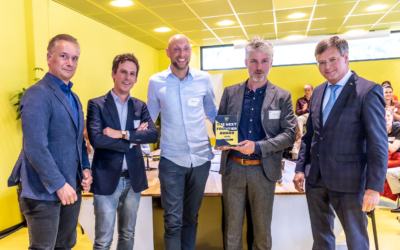
Spatial Atomic Layer Deposition key component in battery pre pilot line
Kalpana Systems' research partner Holst Centre opened a pre-pilot line for next-gen batteries. In this production line spatial ALD is a key component.
Kalpana Systems is able to apply functional coatings, of only a few atoms thick, to flexible substrates in high volumes. The process that makes these coatings possible – Atomic Layer Deposition (ALD) – until recently only was possible with low throughputs. Kalpana is developing a machine that can realize high volumes of Spatial ALD. By making this process economically viable, Kalpana ensures that batteries can get double the charging speed and flexible solar cells become cheaper, lighter and more efficient. Therefore, the technology means a revolution for batteries and solar cells worldwide and a crucial step in the energy transition. Kalpana receives an investment of €550,000 from proof-of-concept fund UNIIQ and a small group of private investors. This capital injection will enable Kalpana Technologies to design and build the first prototypes of its roll-to-roll spatial ALD machine.
Create functional layers with atomic-level precision
Thin layers on flexible foils are present in many places, both in low-value applications, such as a bag of crisps, and high-end applications, in the semiconductor industry. Atomic Layer Deposition (ALD) allows manufacturers to create functional layers of just a single atomic thick with perfect coverage. In applications where perfect coverage without defects is important for the operation of the flexible product, but a thin layer leads to better performance, ALD offers one of the best solutions. Until now, large-scale application was not yet economically viable due to low throughput speeds. Therefore, ALD is mainly used for mega high-quality applications, such as in the semi-conductor industry. Kalpana’s roll-to-roll machines finally makes this technology economically viable. As a result, batteries can now be doubled in charging speed and capacity & flexible solar panels can be produced cheaper, lighter and more efficient. These are crucial developments to kickstart next generation energy technologies and thus make a significant contribution to the energy transition.
High-volume Spatial Atomic Layer Deposition
Kalpana Systems is developing a machine that can realize high volumes of Spatial ALD. Thanks to a smart innovation of the transport system of the flexible substrate, continuous production can be applied at high speeds, which radically reduces the costs per square meter of the layer. The design ensures that the machine can be integrated into manufacturers’ production lines. This makes it suitable for a wide range of applications. Kalpana Systems wants to help companies to integrate the proven benefits of ALD into production processes in a scalable and cost-effective way.
The Kalpana team builds on years of experience in ALD and mechanical engineering; this has led to the development of the patent-pending innovation. Kalpana uses the investment from UNIIQ and the co-investors to develop a first working prototype.
Diederick Spee, Co-Founder of Kalpana Technologies: “The Kalpana team has extensive experience in mechanical engineering. We have personally experienced the limitations ALD still has for flexible applications, and how difficult it is to remove these limitations. We are convinced that our technology will accelerate the adoption of ALD among producers of energy technologies such as batteries and solar panels. We are grateful for the investment that UNIIQ is making with the co-investors. This investment enables us to work towards a working prototype which will help convince potential customers. We would therefore like to ask companies that have considered ALD in the past to contact us. We remove the ‘traditional’ objections to using ALD.”
Hans Dreijklufft, Fund Manager UNIIQ: “Kalpana Technologies is another great example of how we, as Early Phase Financing powered by UNIIQ, accelerate innovation by enabling entrepreneurs to deliver a proof-of-concept. We are proud to be able to add a technology in which the Netherlands is thriving to the portfolio. We are confident that the Kalpana team is an important enabler of, among other things, new solar cell architectures, which in turn help make the world cleaner.”

Kalpana Systems' research partner Holst Centre opened a pre-pilot line for next-gen batteries. In this production line spatial ALD is a key component.

Price awarded by former prime-minister Jan Peter Balkenende.

The National Growth Fund granted around €800 million to the proposal by the Battery Competence Cluster-NL, a collaboration which Kalpana Systems is part of.